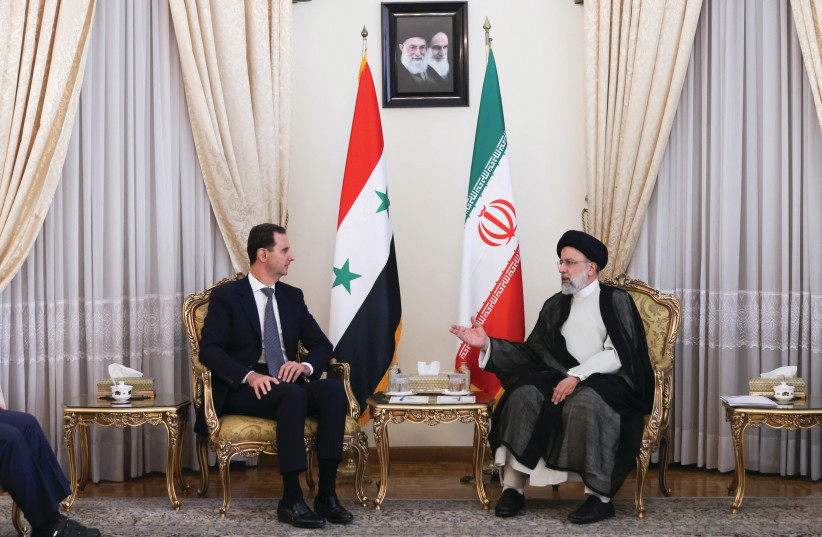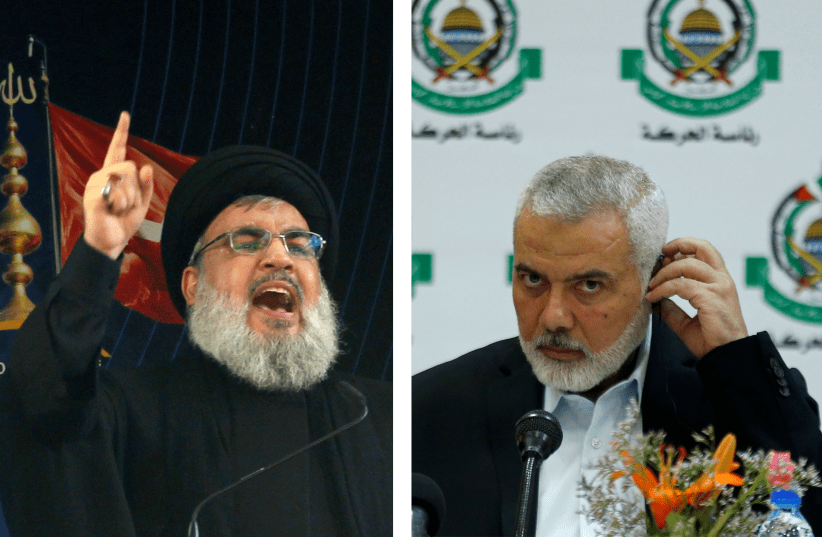Hamas leader Ismail Haniyeh met in Beirut with Hezbollah chief Hassan Nasrallah to discuss resistance efforts against Israel, after a tense weekend in which his terror group fired rockets across the country’s southern and northern borders.
Haniyeh’s deputy Saleh al-Arouri was also present at the meeting, which was reported on by the affiliated news outlet Al-Mayadeen.
In Israel, the IDF continued to reinforce itself with additional reserve forces, which was itself a response to several days of rocket attacks from Gaza, then Lebanon and then Syria, as well as multiple terror incidents and tension surrounding the Temple Mount at the height of Passover and Ramadan.
The IDF last week had already called up unspecified numbers of reservist Border Police officers, and air defense and air force attack personnel. On Saturday, it was announced that there would be reinforcements of police in Tel Aviv following a car-ramming attack there.
"The crimes of the Zionist regime are a sign of weakness and are proof of a bright and promising future for the resistance movement."
Iranian President Ebrahim Raisi

Then on Sunday, the IDF and Israel Police announced that they were calling up an additional four companies of reservists, after having called up six companies in recent weeks.
All of this came after the IDF called up multiple additional battalions (larger than companies) in recent weeks to handle security issues in Huwara and other West Bank hot spots.
Al Mayadeen reported that Nasrallah and Haniyeh discussed further coordination of “resistance” efforts.
The IDF has also sent clear signals that it views Iran, Syria and Hezbollah as being responsible for the overall threat picture, even as it accused Hamas or Palestinian groups affiliated with it of actually firing the rockets.
In its responses to rocket fire, the IDF struck not only Hamas positions in Lebanon and Gaza, but also Iranian ones in Syria, as well as some affiliated with the regime of Syrian President Bashar Assad.
There was speculation that the IDF was trying to get Assad to restrain Iran and get Tehran to restrain the groups that fired on Israel, or face further IDF retaliation.
There have been no new rockets fired on any front since the IDF’s latest airstrikes against Syria on Sunday morning.
Iranian, Syrian presidents talk "resistance" against Israel
Also on Sunday, Assad and Iranian President Ebrahim Raisi discussed Ramadan and “resistance” efforts against Israel. According to Iranian state media outlets, Raisi told Assad that “the crimes of the Zionist regime are a sign of weakness and are proof of a bright and promising future for the resistance movement.”
Raisi further claimed the world was changing and that support was now growing for the “axis of the resistance” against Israel, according to the Iranian Students’ News Agency.
As of press time, Sunday had been the quietest day in terms of new violence in several days.
Ongoing Israeli-Palestinian clashes amid Passover, Ramadan
Although there were confrontations between Palestinians and the Israel Police, they were muted compared to last week. On Wednesday, police stormed al-Aqsa Mosque in order to ferret out Palestinians who tried to barricade themselves inside overnight in violation of a curfew agreed upon with the Wakf Islamic religious trust, through which Jordan administers the Muslim holy sites.
In that incident, police fired stun grenades and removed the people inside; Palestinians in the mosque shot fireworks and threw stones at Israeli forces. Dozens of Palestinians were reportedly injured or arrested in those clashes.
Footage from the scene published by Palestinian media showed police officers hitting Palestinians in the mosque with chairs and batons and arresting many of them.
A few hours after last week’s clashes, 10 rockets were fired from the Gaza Strip toward southern Israel. That was followed by further rocket fire in the next two days from Gaza, Lebanon and later Syria.
Although 842 Jews ascended the Temple Mount on Sunday, a 43% increase in worshipers compared to last Passover, the larger numbers did not lead to more conflict.
In fact, over Saturday night and Sunday, the police did not have much direct conflict with Palestinians, despite some of them violating the curfew again.
There were also no new terror incidents on Sunday after multiple incidents on Friday in Tel Aviv and the Jordan Valley.
The rise in tensions in recent weeks between Israelis, Palestinians and neighboring countries comes amid the coinciding holidays of the week of Passover and the month of Ramadan, both of which see worshipers flock to Jerusalem’s holy sites.
Tovah Lazaroff and Tzvi Joffre contributed to this report.
